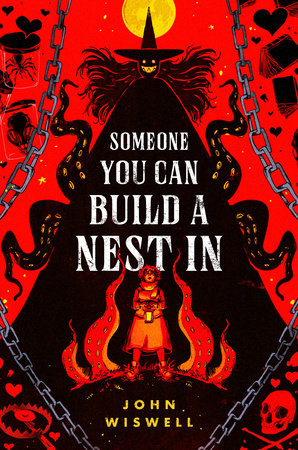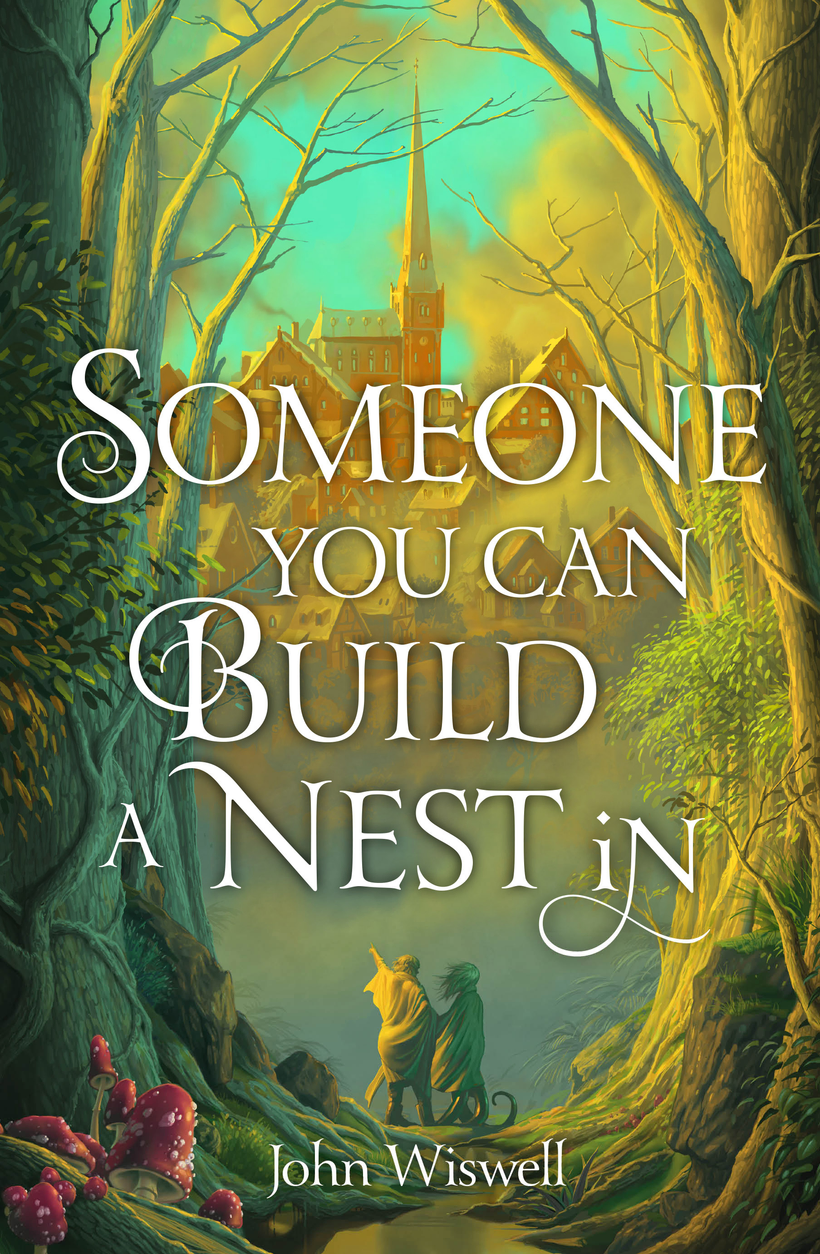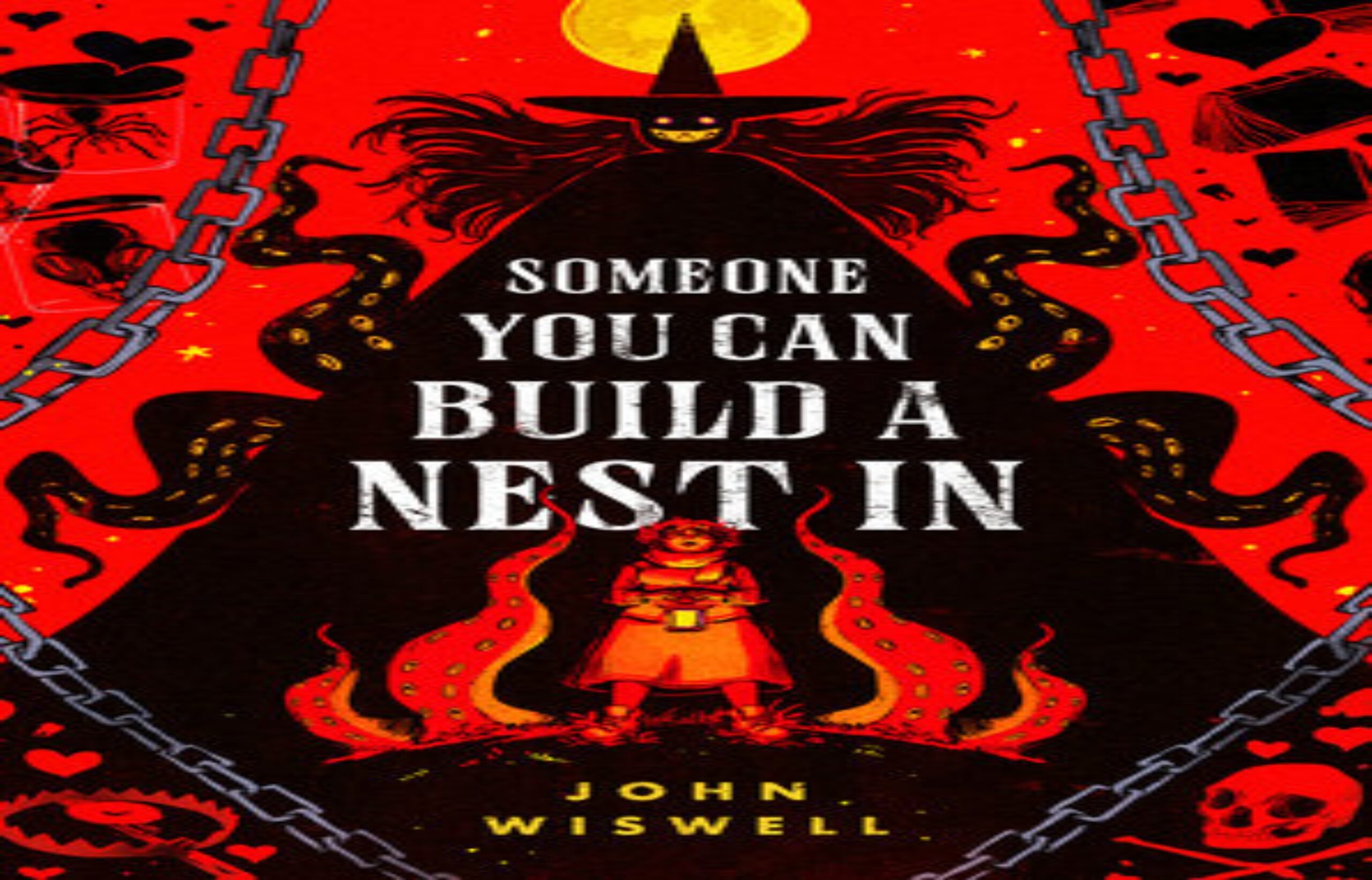I’m happy to count myself among John Wiswell’s dedicated fanbase. His stories often explore serious societal shortcomings, yet leave me feeling hopeful and uplifted. He has won both the Nebula and Locus awards and has been a finalist for the Hugo, British Fantasy, and World Fantasy awards. His debut novel, Someone You Can Build a Nest In, will be released in 2024 by DAW Books.
I appreciate the opportunity to talk with him about his forthcoming novel and his warmhearted approach to genre fiction. Thanks, John, for fitting this interview into your schedule!
—Myna Chang
Myna Chang: Let’s start with your upcoming novel, Someone You Can Build a Nest In. The book has already generated a wave of pre-release excitement in the genre community. What’s the story about? Can you give us a sneak peek at your protagonist?
John Wiswell: Shesheshen is a simple woman with simple needs: find someone who will donate their olfactory passages, avoid getting trapped by the hunters, and hibernate on a full belly. We’ve all been there, right? She’s a shapeshifting creature with no endoskeleton, absorbing unused bones from people and household items like stones to form her own skeleton. She’s found a chain makes a great backbone. In all her years, no would-be hero has successfully slain her. She is a survivor.
She’s been hunted all her life. After she’s poisoned and driven off a ravine, she’s rescued by a peculiar human named Homily. Homily is a cinnamon roll, equally bookish and quirky. Homily, both nurses Shesheshen back to health and connects with her in ways Shesheshen didn’t know were possible. Is she someone Shesheshen could actually love? Is that something that happens to monsters? The questions chafe at her, and the closer the two get, the harder it is for Shesheshen to hide the truth. She’s just about to confess her monsterhood to Homily when Homily reveals why she’s in the region: she’s here hunting a terrible shapeshifting monster. Has Shesheshen seen it anywhere?
MC: How did this idea come together for you? Did the writing process flow smoothly, or did you encounter any hiccups?
John: This book was always about Shesheshen and Homily. It was about Shesheshen and Homily before it was even a book! Before it was a plot; before I knew I was telling a story. It began with the monstrous figure, feared by all the locals, accidentally smitten with the sweet nerd and desperately trying not to blow it. The more time I spent with them, though, the deeper and broader they became. Shesheshen’s pain as an ostracized figure, her queerness, her disabilities, her neurodivergence, all came pouring out. And as fascinated as she was with Homily, Homily invariably deepened too because the people we think are wholesome and generous always have suffered more than we think.
So their story came gushing out of my heart. I feel lucky to have met the idea of them.
I began writing it in 2019, and as COVID raised its head, I dove more into the keyboard. I thought I was one of those lucky ones who would just keep writing through the pandemic. I got all the way to the end of the epilogue.
And then the words shut off. I finished their story, thanks to these two amazing characters. But with that done, that’s when everything caught up with me. It took a lot of work to pull myself back to the keyboard, to edit and revise and hone the book. Every writer had their own turbulence (or worse) in those days. For me, I wrote a lot of things I was passionate about in those first two years as I clawed my way back to writing. But I did it all to get back to the place where I could work on their story again. I wanted to give what they had to the readers who needed it.

US Cover by J.M. Fenner

UK Cover by Stephen Player
MC: The covers for the book, both the US and UK editions, are amazing! Each has a distinct vibe. Do the images play to different aspects of the narrative?
John: They do! J.M. Fenner (for the U.S. edition) and Stephen Player (for the U.K. edition) did amazing jobs tapping into totally different parts of the text. It tickles me watching readers pick which they like better. Fenner’s cover is an ode to Shesheshen, the monstrous protagonist, in all her shameless glory. Player’s cover is an ode to Homily, the cinnamon roll love interest, in all her warmth and optimism. I love both so much that I need a copy of each to sit next to each other on my shelf.
MC: You have a distinctive style in your short stories; does this novel align with that style? How does this book fit into your overall body of work?
John: This book is a natural outgrowth of much of my short work. Where “Open House on Haunted Hill” held a heart for haunted houses, and “We Are Not Phoenixes” held a heart for pyromancers, and “That Story Isn’t The Story” held a heart for familiars? This comes from a similar warm-hearted place for characters and creatures we normally abhor.
This novel holds a heart for a shapeshifting monster, and that heart keeps growing. She’s hunted by everyone in the so-called civilization. She’s wrestling with the safety of staying alone and daring to hope she could have a connection with this amazing, bookish weirdo. She is as opinionated about humans as any creature I’ve ever met, and what she doesn’t understand about us is often what we don’t understand, either. She’s got that essential humor, as well as that essential relatability. You might find yourself feeling a lot in common with the creature who’s trying on foot bones the way others try on shoes—she’s got to get the right feet to go dancing, after all.
MC: I’m a huge fan of your short stories—not only because they give voice to characters we don’t always hear from, but also because they frequently make me laugh out loud. How do you achieve this balance? What are the benefits of pairing humor with hard-hitting subject matter?
John: Humor is one of the natural outcomes of social friction. It can dispel tension, or it can acknowledge it, frame it, even demand more attention be paid to it. In my best friendships, it has been a means for bonding, and becomes a love language. So there’s no way I wouldn’t bring that into my stories of serious things.
But I rarely sit down saying, “Today, I will write a funny story.”
Rather, humor is part of warm-heartedness and an openness to all the emotional reactions we have to life. I want my characters to experience joy and tenderness because those are every bit as meaningful as agony and awkwardness. Further, in exploring relief and warmth, we put hardship and conflict into starker contrast. The love characters have for each other raises the stakes when things get fearsome. So, to some extent, I write about these things as reminders about what we’re fighting for.
MC: Your stories have appeared in celebrated publications such as Uncanny, Lightspeed, and Tordotcom, and are frequent finalists in all the big awards. In your 2023 year-end wrap-up, you said, “I’m proud of all my weirdo fictional children. Each story I published this year did something totally different.” Tell us about this wide range. Do you have different craft goals for each story? Do you write with a specific market in mind?
John: Often, when I start a new short story, I ask myself to either do one thing differently than I have in my other work or to do something that will remind me of some quality in my work I’ve lost touch with. So: either expand my horizons, or scrub the rust off my tools. That way, even if the story doesn’t sell, I’ll still expand my toolkit as a writer. Which isn’t to say my authorial intentions always land for the reader.
However, in 2023, I published five short stories, and they’re quite different. “Bad Doors” is my first story about the isolation and emotions of the COVID-19 pandemic; “So You Want to Kiss Your Nemesis” is an airy comedy about queer elders and queer youths and certain Fantasy rival tropes; “Fossils of Us” borders on the cosmic in its Horror and SciFi trying to put humans in their place; “Irresponsibly Human,” meanwhile, is a SciFi Comedy about an alien absolutely underestimating what it takes to be human; and “Three O’Clock Dragon” is both is a quirky Fantasy story about a dragon running for mayor so she can call off the hit squads that are after her. Most of these stories wouldn’t get along with each other if you trapped them in a room together. Each pushed my craft in different directions, and writing them will help me reach new things next time. From the darkest part of one to the most warmhearted part of another, I love them all. They’re my little prose babies.
To put it in simpler terms, this year, I was a Nebula, Locus, and Hugo finalist for “D.I.Y.” That is a story about Noah Byrne, a disabled, ace/aro boy who wants to go to wizarding school but can’t afford it. Now, I am ace/aro, I am disabled, and I’ve had financial hardships. You’d think that representation would be easy, but often, writing about yourself is the hardest thing. When I first had this character idea for Noah, I couldn’t pull it off. I had to write stories about ace and aro characters, and other stories about disabled characters, and other stories about characters with financial hardship, before I could balance all of those elements in Noah in this story. Each story I wrote helped me write “D.I.Y.” And “D.I.Y.” will help me write others.
MC: Your short story, “Open House on Haunted Hill” (Diabolical Plots), won the 2021 Nebula Award for Best Short Story, and was a finalist for the Hugo, Locus, and World Fantasy awards. As if that wasn’t enough, the story was also featured on LeVar Burton Reads. Tell us about the story and how it came together for you.
John: That’s a funny one! I was at the World Fantasy convention and was explaining how much I love Horror, but that I seldom write it. Horror has a certain range of compassions that I love, but when I express myself on the page, different compassions come out. I eat nightmares and barf rainbows, I guess! And I told everybody: if I was going to write about a haunted house, I’d write about a lonely one that promised to behave if people would come live in it. I expected sympathy, but instead, all the writers around me begged me to write that story.
On the train ride home, I started work on it. I fell more in love with 133 Poisonwood by the page and the kinds of interlocking care that unfolded. I never expected how many people would love that house. To this day, I’m so glad people pushed me to create it.
MC: Your novelette, “That Story Isn’t the Story” (Uncanny), won the 2022 Locus Award for Best Novelette and was a finalist for the Nebula and Hugo. What inspired this story? Did you enjoy writing to this length?
John: That specific length was liberating. Anton’s story was one about the small steps of character growth over a long period of time. His story wouldn’t fit in a typical short story, especially not if I wanted to include all the engagement with Grigorii that helped shape his future. His story wasn’t a novel story, though. It was tight, and you’ll see many of the scenes are quite short. But he needed the room to breathe. And if you’ve read Anton’s story, you know the man deserved to breathe. I breathed with him.
With the technical length of novelettes I could have gone a lot longer, and yet the story felt tight. It was the right length to do Anton justice. And then, like a lot of my favorite short work I’ve written, I left it short enough that as much of him as I showed, I managed to give him an essential privacy. It’s funny to think about fictional characters getting restorative privacy. But when you think about the hardest journeys characters go through, sometimes we, the audience, need that privacy for them.
MC: Where is the best place for readers to follow you and your work?
John: Linktr.ee/johnwiswell has a round-up of every social media platform I’m on. You can find me at most places! I try to stick my head out at least a few times per week.
MC: What’s next for you?
John: I have a two-book deal with DAW and I’m currently deep into writing my second book for them. That book isn’t announced yet, and I don’t want to get in trouble! But I can tell you it’s about gods behaving badly—and one troublesome believer who won’t give up on them. It’s playing with relationships and cosmic powers in ways I’ve never delved into before.
I’m also still enamored with short fiction. In 2024, I’ll have my third story in Tordotcom, as well as some other unannounced shorts. I have another tab open right now for another short that I can’t stop tinkering with, about geomancers and absentee parenting. The ideas keep raining down on my head. I’m fortunate for the deluge.
***
JOHN WISWELL is a disabled writer who lives where New York keeps all its trees. He won the 2021 Nebula Award for Short Fiction for his story, “Open House on Haunted Hill,” and the 2022 Locus Award for Best Novelette for “That Story Isn’t The Story.” He has also been a finalist for the Hugo Award, British Fantasy Award, and World Fantasy Award. His stories have appeared in Uncanny Magazine, The Magazine of Fantasy & Science Fiction, Diabolical Plots, Nature Futures, and other fine venues. His debut novel, SOMEONE YOU CAN BUILD A NEST IN, will be published by DAW Books in Spring 2024. He can be found making too many puns and discussing craft on his Substack, johnwiswell.substack.com.
Someone You Can Build A Nest In can be preordered here: (US edition) or (UK edition).
***
MYNA CHANG is the host of Electric Sheep SF. Her work has been selected for Norton’s Flash Fiction America, Best Small Fictions, Beneath Ceaseless Skies, Small Wonders, and others. Her micro collection, The Potential of Radio and Rain, was published by CutBank Books in 2023. She has won the Lascaux Prize in Creative Nonfiction and the New Millennium Award in Flash Fiction. See more at MynaChang.com or find her on Bluesky or Twitter at @MynaChang.
